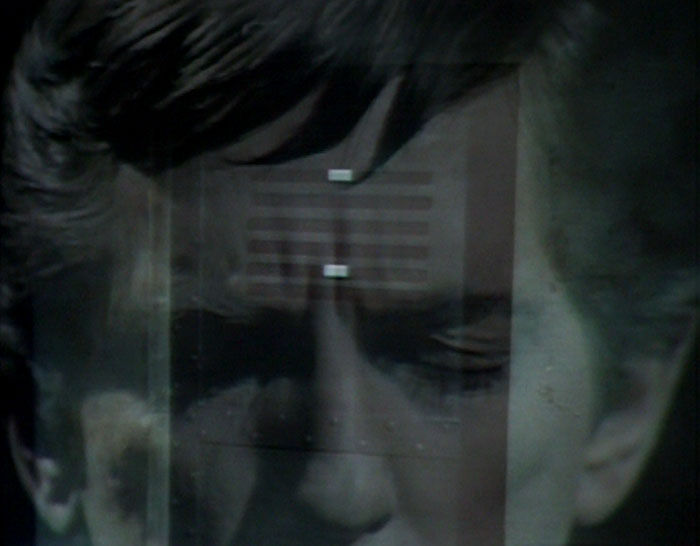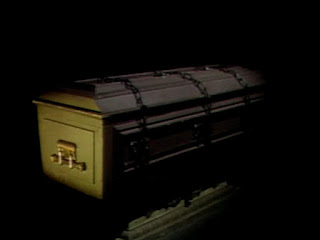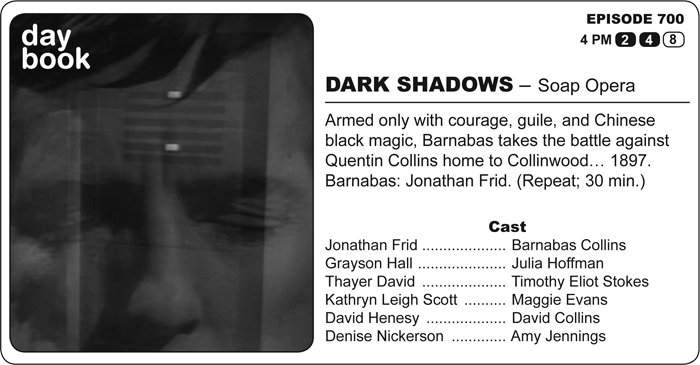
By PATRICK McCRAY
Taped on this day in 1969: Episode 700
Led only by the mysterious forces of Chinese black magic, can Barnabas Collins save the life of David through a terrifying voyage beyond the limits of inner space? Barnabas: Jonathan Frid. (Repeat; 30 min.)
After finding Quentin’s bedchambers and his I Ching wands, Barnabas soon discovers that Maggie’s rescue attempt for David has left the boys in Quentin’s sadistically induced coma. The wands send Barnabas into a trance in which he passes a door that reveals his coffin.
When shows get successful enough, they get their own spinoffs. Only Dark Shadows became its own. Or is it a reboot? 1897 manages to take the best of everything that had come before, repackage it, and make it feel even fresher than ever. Did you like 1795? Cool, let’s make it 1897, capitalizing on the western craze. (It’s essentially The Wild Wild Northeast.) Like Vicki time traveling? Wait until we make it Barnabas. And did you like Barnabas? Put a drink in his hand and swap quips for reproaches, and you’ll love Quentin!
 You could write a month’s worth of articles on the parallels. And I might.
You could write a month’s worth of articles on the parallels. And I might.I’m not sure Dan Curtis knew how long the show would be “gone,” but it had to be less time than they ended up spending away. But we’re not there yet. We’re in 1969. Whether or not Curtis knew that he would be gone for most of the year, he knew this was something special. It’s one thing to know that you’re saying goodbye. It’s another thing to have “goodbye“ sprung upon you. In this case, the characters are abandoned in a manner both methodical and brisk.
It propels us into action by tightly focusing the action on Barnabas’ powerlessness. He can’t stop Maggie from going to Collinwood. He can’t stop David’s coma. Fortunately, he and Stokes waste no time once they finally discover Quentin’s chambers. The entire storyline leading up to 1897 is about building momentum through David and Amy. By having people other than the primary characters make those discoveries first, it allows expositions to be layered upon expositions without making us wonder why nothing is being done. There’s only so much David can do outside of constant patricide attempts. But here, they find the room. Here, Quentin exhibits his cruelty in the most poignant manner, plunging David into a coma just as he reaches Maggie’s arms. So much for trusting adults. Or ghosts. It almost makes me wonder if the ghost is only apparently out for revenge. What if he actually needs Barnabas’ help to save him, and he keeps upping the ante until our hero has no choice?
When you go back and look at the episode it has a spare underpopulated sense of the apocalyptic and the modern. It’s not just a Collinwood that has been abandoned. The abandonment covers the entire show, it seems. This is not a universe that feels as if it has a cannery or a Blue Whale. Maggie is now the Victoria Winters, and although she bravely goes to search for David completely on her own, she is not up to the task. Which is another way of saying that the show is not up to the task of letting its problems be solved by its (replacement) first protagonist. It’s time to call in the biggest big gun possible and send him on a journey through time. It’s also a process that deliberately detaches us from 1969. There is a stark, empty quality to the assignment of characters here. Maggie, David, Barnabas, Stokes. The show has been reduced to the point until there’s almost nothing to which we are bidding farewell.
Several years before, David Bowman flew his pod into the monolith. It was a lonely point of departure. Something had driven his computer insane. Practically the equivalent of a ghost. The only way he could communicate with that force was by encountering it on its own level. With Frank Poole dead and HAL silenced, Dave had no idea what he was going to confront. Only that he was going truly into the unknown. What was that unknown?
His own sepulcher.
Yet one in which he was reborn.
I can’t say precisely that the authors were influenced by 2001: A Space Odyssey, but perhaps they were.
Certainly, Dark Shadows is about to take its audience on the ultimate trip.
This episode hit the airwaves Feb. 28, 1969.
(Editor's note: The Dark Shadows Daybook feature has been a long and winding road, one that has made it necessary at times to backtrack and cover old ground. Patrick first wrote about this episode in 2017. If you want an example of how the Daybook has evolved over the years, look no further than here: http://www.collinsporthistoricalsociety.com/2017/02/the-dark-shadows-daybook-february-21.html)


